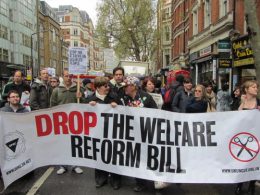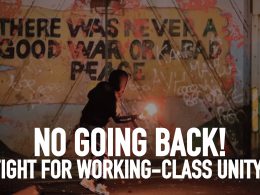Two weeks ago, rioting took place around the Catholic Short Strand enclave in predominantly Protestant east Belfast, in Northern Ireland. Petrol bombs and other missiles were thrown and shots were fired in some of the worst rioting in the area for a decade. The PSNI (Police Service of Northern Ireland) used water cannon and plastic bullets.
Rioting in east Belfast on Monday 20th and Tuesday 21st June – the worst in recent years – did not appear from a blue sky. Throughout the ‘Troubles’, the interface between the Catholic Short Strand and Protestant Lower Newtownards Road has been the scene of sporadic sectarian violence emanating from both communities. In recent months, there has been an increasing number of attacks on homes in both areas and this has ratcheted up sectarian tensions. The weekend of the 18th and 19th June was particularly tense, with attacks on homes in both communities intensifying and a young Protestant woman being hit by a brick thrown from the Short Strand. The UVF [Ulster Volunteer Force (UVF) – a loyalist paramilitary organisation] used this incident to organise hundreds of young people from across east Belfast to join them in an orchestrated attack on the Short Strand.
There is little doubt that the UVF carried out the attack for its own cynical reasons. It has been angered by the Historical Enquiry Team’s continued investigation into its role in sectarian atrocities during the Troubles [the Historical Enquiries Team was established by the PSNI to “examine all deaths which can be attributed to the security situation here between 1968 and 1998”].
Like the rioting in Rathcoole [a housing estate in Newtownabbey, County Antrim, last year, this was an attempt to flex its muscles and send a warning to the state to back off. Internal tensions in the UVF and attempts by the UVF in East Belfast to establish its independence from the UVF Shankill Road leadership may also have been factors leading up to the riots. On Wednesday 22nd June, UVF members were among those stewarding the area to prevent clashes between young people following a series of talks. Obviously, they felt their point had been made. The UVF certainly did not bring the attacks on the Short Strand to an end because of any concern for either community.
Shots fired
When the rioting broke out dissident republican paramilitaries consciously intervened.
Two young Protestant men, and a journalist, were injured by shots fired from the Short Strand. The dissident groups wish to be seen as the defenders of the community and in a highly symbolic action fired from the grounds of St Matthew’s Church. Forty years ago Billy McKee, Belfast commander of the newly formed Provisional IRA, fired from the same place in a gun battle which left five dead. This was one of the key events in the establishment of the Provisionals as a substantial force. The myth developed that the Provos had defended the area. In reality, such armed actions are not capable of defending working class communities. It wasn’t true forty years ago and it is certainly not true now. In reality, the actions of the dissidents increase sectarian division and are designed to do so. The dissidents are seeking to develop a base of support in the communities by their actions and have no interest whatsoever in the welfare of working class people.
These events are yet another demonstration that, despite the propaganda from the establishment, sectarianism has not been overcome by the so-called ‘peace process’. In fact, as the Socialist Party has previously explained in depth, the institutions established by the Good Friday Agreement have cemented and deepened sectarian division. The rioting also reflects the dire social conditions which exist in these communities. Both the Short Strand and the Lower Newtownards Road are marginalised working-class areas with high levels of unemployment and poor educational opportunities for young people. Youth who see no hope of a decent future and who feel alienated from society can be drawn towards sectarian forces such as the UVF and dissident republicans.
Assembly parties depend upon sectarian division
Peter Robinson publicly offered to intervene into the situation to try to find a resolution but neither he nor any politician from the main parties can solve these problems- all the Assembly parties depend upon sectarian division to maintain their political power. They have overseen the development of economic and social conditions in these communities which fuel sectarian violence. Now, they are implementing £4 billion cuts to public services which will drastically worsen these conditions. Neither can the intervention of the PSNI prevent such conflicts from flaring up. In fact, the actions of the PSNI often serve to increase tensions.
For now, the conflict has subsided but nothing is resolved. The conditions which sparked the riots remain to ignite at another point, not just in east Belfast but at all sectarian interfaces. The riots serve as a warning of what lies in store this summer and in the longer term if the underlying issues are not dealt with. Already there has been trouble at the Twadell Avenue/Ardoyne interface [North Belfast], further confrontations around the Short Strand and the 12th July parades are just around the corner.
The majority of people in the Short Strand and lower Newtownards Road, and the majority of people in other interface areas, are totally opposed to sectarian attacks. Despite this conflict does break out. Conscious sectarian elements deliberately foment low level attacks on a regular basis and seek opportunities to provoke more serious outbreaks of violence. Whilst working class people on either side of the ‘peace-lines’ can and do work hard in their own areas to prevent attacks, it is of vital importance that genuine activists link up and work together across the peace-lines if a more permanent solution to the problem of sectarian attacks is to be found.
Joint bodies of trade union and genuine community activists should be established across the interfaces. Such groups should engage in a co-ordinated manner to prevent sectarian attacks, for example, by organising joint patrols of areas and joint stewarding when necessary. To really make an impact and to put sectarian groupings on the defensive, it is important that such bodies are not just an attempt to link two communities with separate identities and interests. Negotiations, discussion and agreement are of course vital but ultimately ways must be found to genuinely bring working class communities together. Genuine grassroots anti-sectarian bodies must attempt to represent the common interests of working class people on either side of the interfaces. Such common interests include the fundamental right to live in peace and free from sectarian harassment, intimidation and attack, and the right to a decent job on a living wage, and to high quality services for themselves and their families.
It is not possible to outline in advance the exact way in which successful anti-sectarian initiatives will take shape. It can be stated that however that trade union activists based in interface areas can and should play a key role in taking such initiatives. The trade unions are by far the largest organisations which unite working class people. At key points throughout the last forty years trade union activists have held the line in combating sectarianism. Unity in the workplace depends to a large extent on the activists who build the unions. These same activists can play a key role now in initiating united working class action against sectarianism and sectarian attacks in all working class areas, including interface areas.
Taking such initiatives is not easy, especially at times of sharp increases in tension and violence. If even a handful of activists on both sides of an interface were to take a stand however, they could mobilise large numbers of local people behind them, and transform the situation. A determined lead can make all the difference. Local action to tackle local threats is key but so too is the role of the wider trade union movement which can generalise anti-sectarian movements through local and Northern Ireland wide strikes and city and town centre demonstrations and rallies.
A political alternative
Anti-sectarian bodies should consciously take up social and economic issues from the outset. Uniting communities in their common interests, to campaign on issues like youth unemployment and oppose attacks on services would not only strengthen campaigns on these issues, but would help to break down sectarian divisions. Ultimately, tackling the conditions which breed sectarian conflict is the only way to defeat the reactionary forces that base themselves on division.
The collapse in turnout in the recent elections demonstrates that a growing layer of workers and young people are completely disillusioned with the main parties. Many of those who stayed at home are repulsed by sectarian politics. However, as the recent events in east Belfast demonstrate, if a political alternative is not built, then reactionary, sectarian groups can develop further and gain support. A new party of the working-class, which actively combats sectarianism, is urgently needed. The trade union movement has an essential part in bringing such a party into being and must now begin to take steps in this direction. A new party will only develop a stable mass base if it adopts the socialist policies which are capable of delivering real change for the communities in the Short Strand and Lower Newtownards Road and every other working class community in Northern Ireland. Ultimately only a socialist transformation of society is capable of delivering real change and sweeping away the poison of sectarianism forever.












